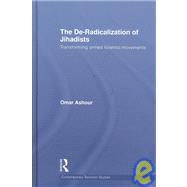
Note: Supplemental materials are not guaranteed with Rental or Used book purchases.
Purchase Benefits
What is included with this book?
| List of illustrations | p. vii |
| Foreword | p. viii |
| Acknowledgments | p. xiii |
| List of abbreviations | p. xiv |
| A theory of de-radicalization | p. 1 |
| Introduction | p. 1 |
| Definitions and typology | p. 4 |
| A typology of Islamists | p. 7 |
| How does de-radicalization develop? | p. 11 |
| Method of investigation | p. 17 |
| The general structure of the book | p. 18 |
| The good, the bad and the ugly: moderation, radicalization and de-radicalization in Islamist movements | p. 19 |
| On radicalization | p. 19 |
| On moderation | p. 25 |
| On de-radicalization: a gap in the literature | p. 30 |
| Conclusion: what is new? | p. 31 |
| Historical overviews of de-radicalization cases | p. 33 |
| Historical background of the Muslim Brothers | p. 33 |
| Historical background of the Islamic Group | p. 45 |
| Historical overviews of other armed Islamist movements | p. 51 |
| Conclusion | p. 61 |
| The untold story: the de-radicalization of the armed wings of the Muslim Brothers | p. 63 |
| The de-radicalization attempts: successes and failures | p. 64 |
| The first attempt (1951-1953) | p. 64 |
| The second attempt (1964-1965) | p. 74 |
| The third attempt (1969-1973) | p. 80 |
| Conclusion | p. 86 |
| The de-radicalization of al-Qa'ida's allies: the Islamic Group and al-Jihad Organization | p. 90 |
| The causes of de-radicalization of the Islamic Group | p. 91 |
| The causes of de-radicalization of al-Jihad Organization | p. 102 |
| Al-Jihad's de-radicalization: the effects on al-Qa'ida | p. 106 |
| Conclusion | p. 108 |
| De-radicalization in Algeria: successes and failures | p. 110 |
| Setting up the argument: ideology, controversial terms and missing variables | p. 111 |
| The de-radicalization process of the AIS | p. 118 |
| The de-radicalization failure of the GIA | p. 127 |
| The further radicalization of the GSPC | p. 131 |
| Conclusion | p. 134 |
| A world without violent Jihad? | p. 136 |
| The findings in comparative perspectives | p. 137 |
| Research and policy implications | p. 143 |
| Notes | p. 146 |
| Bibliography | p. 181 |
| Index | p. 198 |
| Table of Contents provided by Ingram. All Rights Reserved. |
The New copy of this book will include any supplemental materials advertised. Please check the title of the book to determine if it should include any access cards, study guides, lab manuals, CDs, etc.
The Used, Rental and eBook copies of this book are not guaranteed to include any supplemental materials. Typically, only the book itself is included. This is true even if the title states it includes any access cards, study guides, lab manuals, CDs, etc.